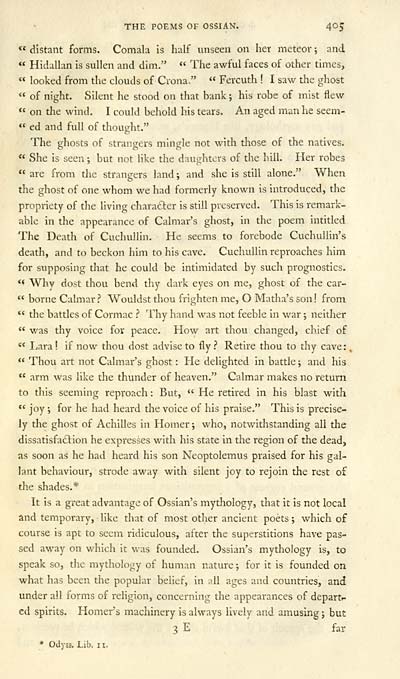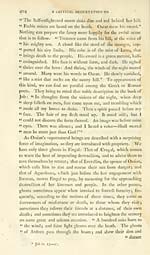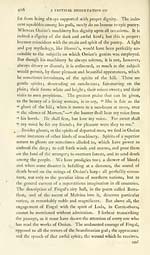Download files
Complete book:
Individual page:
Thumbnail gallery: Grid view | List view

THE POEMS OF OSSIAN. 405
«' distant forms. Comala is half unseen on her meteor ; and
« Hidullan is sullen and dim," " The awful faces of other times,
" looked from the clouds of Crona-" " Fercuth ! I saw the ghost
« of night. Silent he stood on that bank ; his robe of mist flew
" on the wind. I could behold his tears. An aged man he seem-
« ed and full of thought."
The ghosts of strangers mingle not with those of the natives.
" She is seen ; but not Hke the daughters of the hill. Her robes
" are from the strangers land; and she is still alone." When
the ghost of one whom we had formerly known is introduced, the
propriety of the living character is still preserved. This is remark-
able in the appearance of Calmar's ghost, in the poem intitled
The Death of Cuchullin. He seems to forebode Cuchullin's
death, and to beckon him to his cave. Cuchullin reproaches him
for supposing drat he could be intimidated by such prognostics.
*< Why dost thou bend thy dark eyes on me, ghost of the car-
" borne Calmar ? Wouldst thou frighten me, O Matha's son ! from
*' the battles of Cormac ? Thy hand was not feeble in war ; neither
** was thy voice for peace. Hovy art thou changed, chief of
«* Lara ! if now thou dost advise to fly ? Retire thou to thy cave : ,
" Thou art not Calmar's ghost : He delighted in battle ; and his
*' arm was like the thunder of heaven." Calmar makes no return
to this seeming reproach : But, " He retired in his blast with
*' joy ; for he had heard the voice of his praise." This is precise-
ly the ghost of Achilles in Homer ; who, notwithstanding all the
dissatisfa61:ion he expresses with his state in the region of the dead,
as soon as he had heard his son Neoptolemus praised for his gal-
lant behaviour, strode away with silent joy to rejoin the rest of
the shades.*
It is a great advantage of Ossian's mythology, that it is not local
and temporary, like that of most other ancient poets ; which of
course is apt to seem ridiculous, after the superstitions have pas-
sed away on which it was founded. Ossian's mythology is, to
speak so, the mythology of human nature ; for it is founded on
what has been the popular belief, in all ages and countries, and
under all forms of religion, concerning the appearances of departf
cd spirits. Homer's machinery is always lively and amusing ; but
3 E far
* Odyss. Lib. 11.
«' distant forms. Comala is half unseen on her meteor ; and
« Hidullan is sullen and dim," " The awful faces of other times,
" looked from the clouds of Crona-" " Fercuth ! I saw the ghost
« of night. Silent he stood on that bank ; his robe of mist flew
" on the wind. I could behold his tears. An aged man he seem-
« ed and full of thought."
The ghosts of strangers mingle not with those of the natives.
" She is seen ; but not Hke the daughters of the hill. Her robes
" are from the strangers land; and she is still alone." When
the ghost of one whom we had formerly known is introduced, the
propriety of the living character is still preserved. This is remark-
able in the appearance of Calmar's ghost, in the poem intitled
The Death of Cuchullin. He seems to forebode Cuchullin's
death, and to beckon him to his cave. Cuchullin reproaches him
for supposing drat he could be intimidated by such prognostics.
*< Why dost thou bend thy dark eyes on me, ghost of the car-
" borne Calmar ? Wouldst thou frighten me, O Matha's son ! from
*' the battles of Cormac ? Thy hand was not feeble in war ; neither
** was thy voice for peace. Hovy art thou changed, chief of
«* Lara ! if now thou dost advise to fly ? Retire thou to thy cave : ,
" Thou art not Calmar's ghost : He delighted in battle ; and his
*' arm was like the thunder of heaven." Calmar makes no return
to this seeming reproach : But, " He retired in his blast with
*' joy ; for he had heard the voice of his praise." This is precise-
ly the ghost of Achilles in Homer ; who, notwithstanding all the
dissatisfa61:ion he expresses with his state in the region of the dead,
as soon as he had heard his son Neoptolemus praised for his gal-
lant behaviour, strode away with silent joy to rejoin the rest of
the shades.*
It is a great advantage of Ossian's mythology, that it is not local
and temporary, like that of most other ancient poets ; which of
course is apt to seem ridiculous, after the superstitions have pas-
sed away on which it was founded. Ossian's mythology is, to
speak so, the mythology of human nature ; for it is founded on
what has been the popular belief, in all ages and countries, and
under all forms of religion, concerning the appearances of departf
cd spirits. Homer's machinery is always lively and amusing ; but
3 E far
* Odyss. Lib. 11.
Set display mode to: Large image | Transcription
Images and transcriptions on this page, including medium image downloads, may be used under the Creative Commons Attribution 4.0 International Licence unless otherwise stated. ![]()
| Early Gaelic Book Collections > Ossian Collection > Poems of Ossian, the son of Fingal > (417) |
|---|
| Permanent URL | https://digital.nls.uk/77928344 |
|---|
| Description | Selected books from the Ossian Collection of 327 volumes, originally assembled by J. Norman Methven of Perth. Different editions and translations of James MacPherson's epic poem 'Ossian', some with a map of the 'Kingdom of Connor'. Also secondary material relating to Ossianic poetry and the Ossian controversy. |
|---|
| Description | Selected items from five 'Special and Named Printed Collections'. Includes books in Gaelic and other Celtic languages, works about the Gaels, their languages, literature, culture and history. |
|---|

